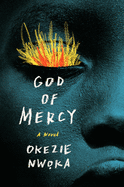
Tradition and change clash to devastating effect in Okezie Nwoka's compelling and heartrending debut, God of Mercy. The novel is set in two postcolonial African villages, one following Igbo beliefs and the other following a form of Christianity.
Ichulu villager Ofodile's promising youth has ripened into a troubled and bitter adulthood after years of failing to find a cure for his daughter Ijeoma's inability to speak. The village itself is troubled by flooding and erosion. The dibia, the community's spiritual leader, doctor and adviser, determines that the nearby Christ-worshipping village of Amalike has cursed Ijeoma and Ichulu. An attempt to make peace ends with the killings of several young men from Ichulu and the banishment of the survivors, including Ijeoma's beloved older cousin Uzodi. Ofodile becomes further embittered, believing he has failed to protect his deceased brother's son.
Then Ijeoma gains the power of levitation, hanging in the sky "like fruit too precious to pluck or a thought too erratic to name." The dibia pronounces her ability the sign of a holy war between Chukwu, the highest ranking god, and Ani, whom the village has traditionally worshipped. Meanwhile, a sadistic Christian pastor and faith healer in Amalike will stop at nothing to see any hint of Igbo faith stamped out forever, and word of Ijeoma and her ability has reached his ears.
Nwoka writes with a sure rhythm all their own, slipping easily between structured passages and stream-of-consciousness inner monologues. God of Mercy translates major religious conflicts to a small, personal scale. Book clubs looking for stories to inspire deep discussion need look no further. --Jaclyn Fulwood, blogger at Infinite Reads

